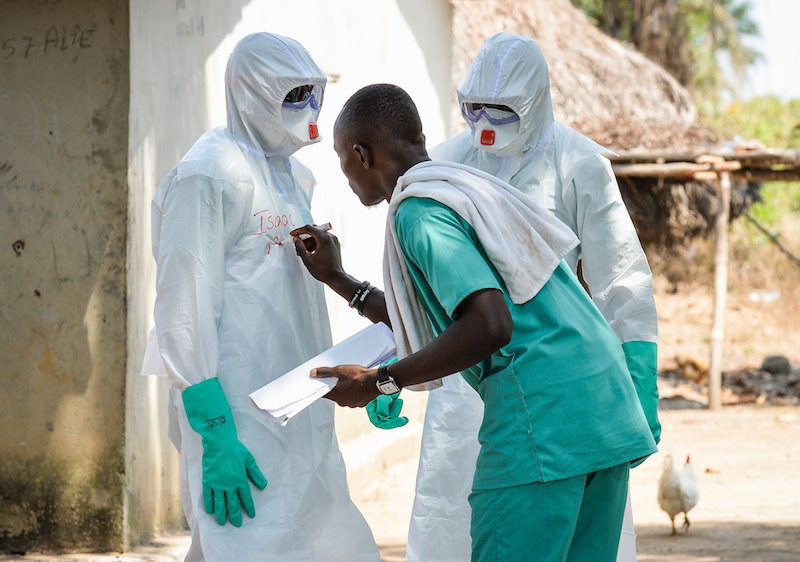Dr Justin Parkhurst reflects on global health in 2020, evidence use in policymaking and his time as Chair of the Global Health Initiative.
This is the first blog in the 12 Days of Global Health series.
2020 has been an unprecedented year for global health in many ways. For scholars and students of this field, COVID-19 presents one of the first pandemics of modern times that has truly affected nearly every corner of the world. In doing so, however, COVID-19 acted as more than just a biological agent. In addition to the morbidity and mortality that the virus brings about in bodies, it has profoundly shaped our social and political worlds as well. In doing so, the pandemic has raised important questions to consider across the natural, clinical, and social sciences alike – from the world’s new found appreciation of epidemiology or mathematical disease modelling, to global health governance challenges, to the fundamental importance of understanding human behaviour, and the politics of response at national levels.
The ’12 Days of Global Health’ blog series will provide insights and reflections on global health topics, issues, and research that emerged over 2020 from members of the LSE Global Health Initiative Steering Committee and associate members. Some of these will be in relation to COVID-19 – indeed it would be a disservice not to address it – but others will focus on areas of global health scholarship and work that continues to be important, pandemics aside. I have served as Chair of the Global Health Initiative Steering Committee for the past three years now and it is my pleasure to introduce this series and begin with my own reflections on an area of work that I have focused on for several years – the use of evidence to inform policy.
COVID has shown some of the real challenges in the assumption that governments should just pursue ‘evidence based policymaking’ – a term that many scholars reject as woefully oversimplified to begin with. COVID further highlights that there are multiple social concerns around which evidence may exist, or be needed, which need explicit clarification before one can reasonably state that a strategy is informed by evidence. Often politicians claimed to be ‘following the evidence’ with no clarity on what it actually means to be doing so. In the UK there was clearly a well-respected advisory body in the form of SAGE providing advice to government, but there have been a range of questions about when SAGE advice was followed or not, or what issues SAGE included in assessments and which ones were ignored.
COVID has shown some of the real challenges in the assumption that governments should just pursue ‘evidence based policymaking’ – a term that many scholars reject as woefully oversimplified to begin with
The pandemic lays bare how large scale health threats in fact involve multiple important policy concerns, and multiple areas for which evidence may be required. The spread of infection is one, of course. Economic impacts are another, which have been used by some politicians as justification to avoid greater public restrictions. Yet health and social policy scholars have raised a range of other important concerns about the impacts of different mitigation strategies. One example of this is to understand when and how non-COVID related health care has suffered due to the COVID response. Other areas of concern are the educational or mental health impacts of school closures, or the greater impact of industrial or school closures on poorer segments of the population. The gendered impacts of lockdowns and related measures have also been raised – including increasing risks of domestic violence, or the unequal burden often carried by women in response to the restrictions in place. Finally, the higher rates of transmission and/or mortality seen in minority groups in a range of countries highlights the importance of having greater evidence about the social determinants of health to inform responses.
In such a context, ‘following the science’ risks becoming little more than a buzzword governments throw around to help build a perception of legitimacy – unless deliberate efforts are made to establish evidence advisory systems that allow multiple pieces of relevant evidence to be provided to decision makers in ways that are transparent around which social concerns are being considered and why. Elsewhere I have written about evidence advisory systems as helping to ‘govern’ the use of evidence in policy settings. This language allows us to move away from over simplistic ideas that policy should be ‘evidence based’ or that governments should ‘follow the science’, and instead ask questions about what the ‘good governance of evidence’ would look like for a pandemic.
‘Following the science’ risks becoming little more than a buzzword governments throw around to help build a perception of legitimacy
Two particular features of a well governed evidence advisory system come to mind in reflecting on these challenges. First is the need for democratic accountability in the face of multiple competing social concerns. In the COVID response, there is clearly a need to have open and honest discussions about the range of social issues at stake, and to clarify and make transparent how the government is either including, or excluding, the set of possible issues of importance to society. Politicians may not wish to lay their proverbial cards on the table in such a way, as it allows greater scrutiny of their true motivations – but in a democratic society it is exactly the kind of transparency required to ensure they are accountable to the public they purportedly serve.
The second element that COVID has particularly highlighted is the ability for an evidence advisory system to respond in real time to complex unfolding events for which there may be gaps in knowledge. Delays while waiting for more evidence can be devastating in epidemic situations. It may be a cliché to say ‘don’t let the perfect be the enemy of the good’ – yet like many clichés there is truth within. One such example was the early resistance by some to widespread face covering (mask wearing) due to a lack of randomised controlled trials (RCT). Yet there is abundant knowledge of the physics of droplet and aerosol spread of infection (and decades of mask wearing to prevent source transmission in medical environments). Just as there is no need for an RCT of parachutes or seat belts, it is hard to justify delay in mask wearing for such reasons.
Politicians may not wish to lay their proverbial cards on the table in such a way, as it allows greater scrutiny of their true motivations – but in a democratic society it is exactly the kind of transparency required to ensure they are accountable to the public they purportedly serve.
Rapid response in the face of evidentiary gaps, however, also means that systems must be ready to learn and gather new evidence in real time, and potentially to change strategies as and when new information becomes available. This final challenge is not easy. The public needs to trust the scientific advisory systems in place, and changes in strategy risk undermining that trust if they appears arbitrary. Politicians similarly may resist changing approaches, lest they be branded indecisive or incorrect. Yet here transparency with the evidence advisory system again remains crucial – to help engender trust in a system that learns and adapts as new evidence arises, rather than blaming one which cannot predict the future.
While COVID is in some way unique, in other ways it is representative of complex unfolding policy concerns that require evidence to inform decisions, yet which equally require democratic deliberation around which social concerns are important and why. Thinking holistically about a well governed evidence advisory system can help to maximise the chances that rigorous, policy appropriate pieces of evidence are used to inform decisions that are representative of, and accountable to, the populations served by politicians – for COVID, and for future public policy challenges alike.
The views expressed in this post are those of the author(s) and in no way reflect those of the Global Health at LSE Blog or the London School of Economics and Political Science.
Photo by Gabriel Sollmann on Unsplash





